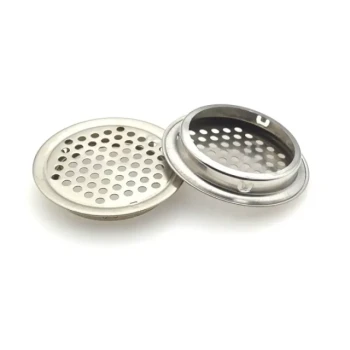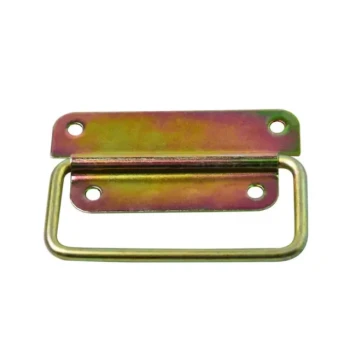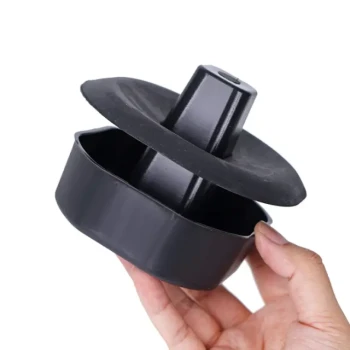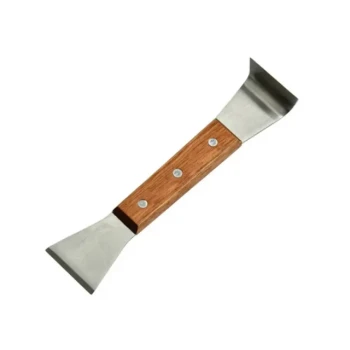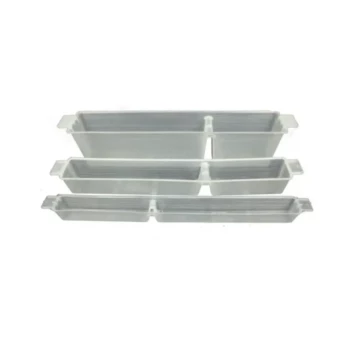At its core, hive insulation is critical for winter survival because it helps the honey bee colony more efficiently regulate its internal environment. By retaining the heat the bees generate themselves, insulation reduces their energy consumption, protects them from dangerous moisture buildup, and shields them from drastic temperature swings.
The primary goal of hive insulation is not to heat the entire hive box, but to help the bees conserve their own energy by minimizing heat loss from their winter cluster. Think of it as giving the colony a high-performance jacket, not a space heater.
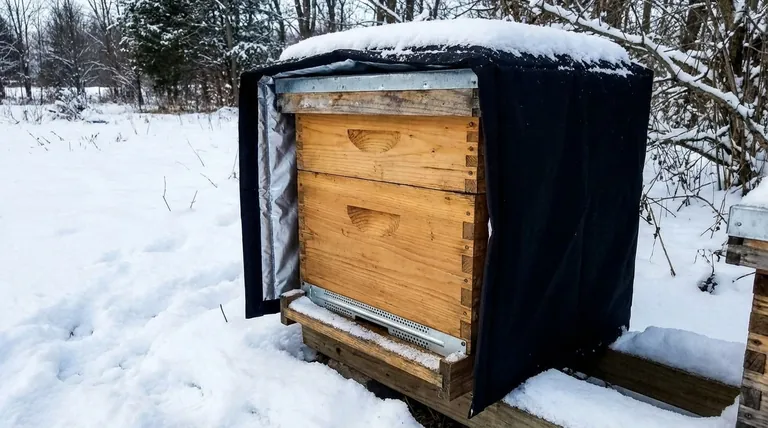
The Deeper Impact of a Well-Insulated Hive
A common misconception is that a beehive is a static, empty box that needs to be kept warm. In reality, it's a dynamic system where the bees actively generate heat. Insulation simply makes their efforts far more effective.
Stabilizing the Internal Climate
Bees form a tight winter cluster to survive the cold. They generate heat by consuming honey and vibrating their flight muscles.
Insulation acts as a buffer, shielding this cluster from the extreme cold outside and, just as importantly, from rapid temperature fluctuations. This stable environment reduces stress on the colony.
Conserving Critical Energy Reserves
A colony's winter fuel is its stored honey. The colder the hive, the more honey the bees must consume to maintain the cluster's core temperature.
Well-placed insulation drastically reduces the rate of heat loss. This means the bees burn through their food stores much more slowly, significantly lowering the risk of starvation before spring arrives.
Preventing Dangerous Condensation
The bee cluster releases warm, moist air from respiration. When this air hits a cold inner surface, like the hive lid, it condenses into water droplets.
This cold "rain" can drip back down onto the bees, chilling and killing them. Insulation keeps the hive's inner surfaces warmer, often above the dew point, preventing this lethal condensation from forming.
Promoting a Stronger Spring Buildup
A colony that emerges from winter with a larger population and ample honey stores is primed for a successful spring.
By reducing winter stress and conserving resources, insulation helps the queen begin laying eggs earlier. This protects the new brood from late-season cold snaps and ensures the colony can build up its population quickly.
Understanding the Trade-offs and Key Principles
Effective insulation is about balance. Simply wrapping a hive without understanding the underlying principles can cause more harm than good.
Insulation Must Work with Ventilation
Insulation without ventilation is a trap. A hive must be able to breathe to expel excess moisture.
A well-winterized hive often includes a small upper entrance or ventilated quilt box. This allows moist air to escape without creating a cold draft, ensuring the benefits of insulation aren't negated by trapped humidity.
Mimicking the Natural Environment
In nature, bees often overwinter in hollow tree trunks with thick, insulating wood walls.
Standard wooden Langstroth hives have relatively thin walls, offering much less thermal protection. Insulation helps bridge this gap, better replicating the stable environment bees are adapted to.
Reducing the Entrance is Complementary
While not insulation itself, using an entrance reducer is a key part of winterizing. A smaller entrance reduces drafts and makes it easier for the colony to defend against pests, which complements the thermal stability provided by insulation.
Making the Right Choice for Your Colony
How you approach insulation depends on your specific goals and conditions.
- If your primary focus is preventing starvation: Insulate the top and sides of the hive to maximize heat retention and drastically reduce the rate of honey consumption.
- If your primary focus is managing moisture: Prioritize top insulation combined with a ventilated quilt box to keep the ceiling warm and allow humid air to escape.
- If your primary focus is protecting a smaller or weaker colony: Comprehensive insulation is even more critical, as a smaller cluster has less manpower to generate the necessary heat for survival.
Proactive winter management gives your bees the best possible chance to not just survive, but to thrive.
Summary Table:
| Key Benefit of Hive Insulation | Why It Matters for Your Colony |
|---|---|
| Energy Conservation | Slows honey consumption, drastically reducing the risk of winter starvation. |
| Moisture Control | Prevents lethal condensation from dripping onto the winter cluster. |
| Temperature Stability | Shields bees from extreme cold and rapid temperature swings, reducing stress. |
| Stronger Spring Buildup | Helps colonies emerge with larger populations, ready for a productive season. |
Equip your apiary for winter success with HONESTBEE.
Commercial apiaries and beekeeping equipment distributors trust our wholesale-focused operations for durable, effective wintering supplies. From insulated hive wraps to ventilated quilt boxes, we provide the equipment your bees need to conserve energy and survive the cold.
Protect your investment and ensure a strong spring. Contact HONESTBEE today to discuss your wholesale needs and let our expertise support your operation's resilience.
Visual Guide
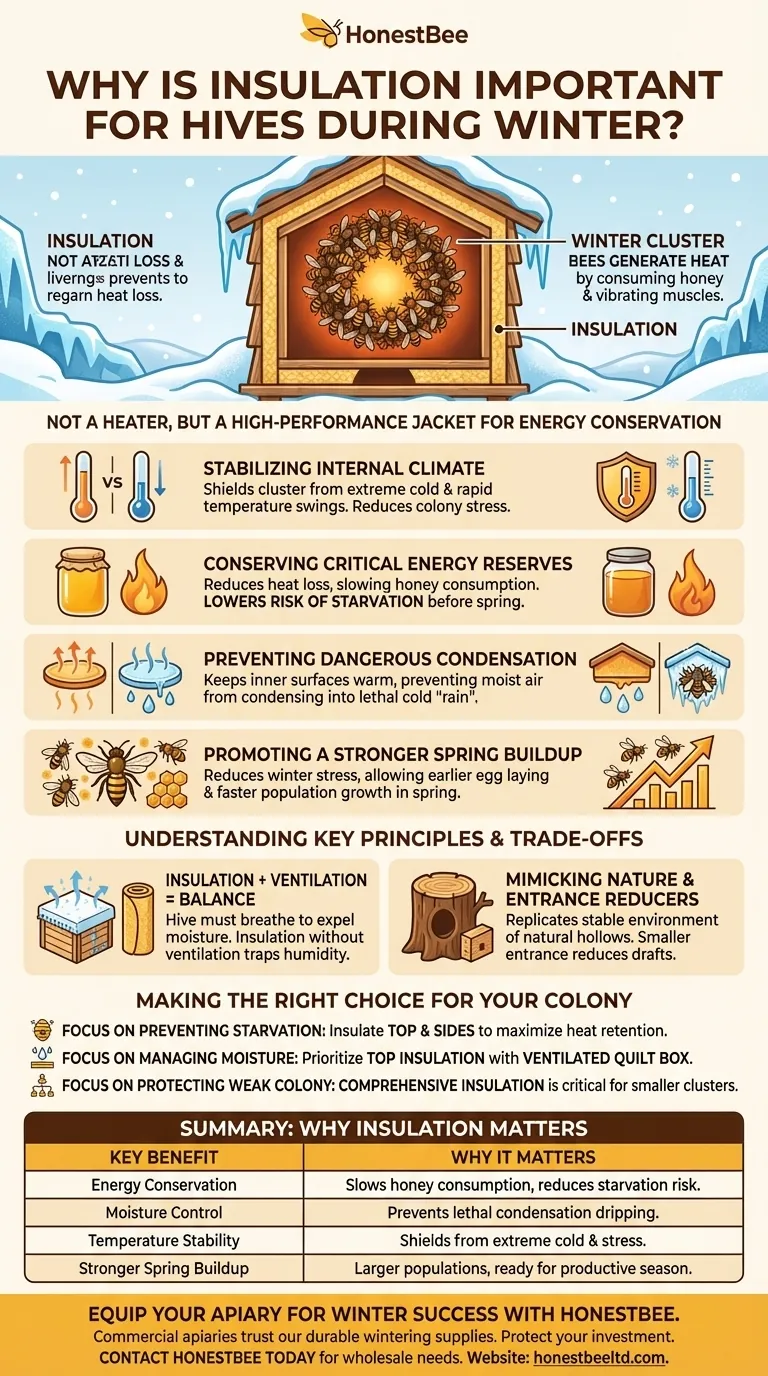
Related Products
- Professional Insulated Winter Hive Wrap for Beekeeping
- Inner Beehive Cover for Beekeeping Bee Hive Inner Cover
- Professional Insulated Plastic Bee Hives
- Telescopic Beehive Outer Cover Lid Roof with Galvanised Sheeting for Langstroth Hive and Beehive Outer Cover
- Stainless Steel Round Beehive Air Vents for Ventilation
People Also Ask
- What are the advantages and disadvantages of straw for beehive insulation? The Eco-Friendly Choice for Warm Colonies
- What happens if there is no ventilation at the top of a hive in winter? Prevent Deadly Condensation and Colony Loss
- What compatibility considerations exist for beehive moisture boards and Hot Boxes? Ensure a Perfect 10-Frame Fit
- What function do specialized wintering buildings or Omshaniks serve? Ensure Bee Survival Through Winter Control
- What is a common misconception about using hive insulation in warm climates? Protect Your Bees from Extreme Summer Heat
- How should beehive insulation strategies be adjusted for mild versus bone-chilling climates? Expert Guide
- How can foam boards be used for beehive insulation? A Practical Guide for Healthier Hives
- Why is it important to winterize honey bee colonies? 3 Vital Steps for Strong Spring Survival




